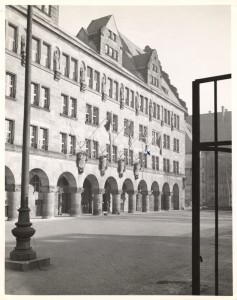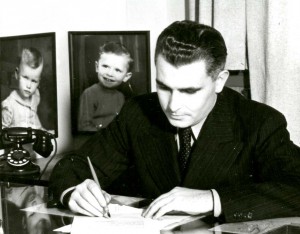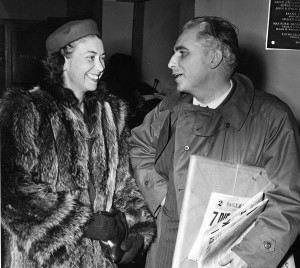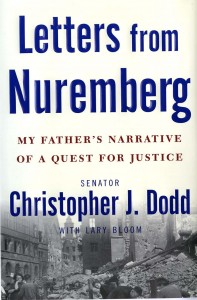Courtesy of this month’s guest blogger, Chris Dodd
This year marks the 70th anniversary of one of the most important achievements in the history of the United States, and indeed the world; the anniversary of triumph of justice and the rule of law over the desire for vengeance. I am talking, of course, about the Nuremberg War Tribunal that brought the atrocities of the Holocaust to light, and the men who perpetrated them to justice, following the end of World War II.
This was an incredible achievement for mankind. As Supreme Court Justice Robert Jackson said at the outset of the trial, “That four great nations, flushed with victory and stung with injury stay the hand of vengeance and voluntarily submit their captive enemies to the judgement of the law is one of the most significant tributes that Power has ever paid to Reason.” As a son of Thomas J. Dodd, this moment in human history has particular significance to me and my family. As a young, 38 year old lawyer, my father was asked to stand up and serve his country as a prosecutor with a solemn obligation to the victims and survivors of the Nazi atrocities to ensure that justice prevailed over inhumanity.
In the summer of 1945, my father left my mother, myself and my four brothers and
sisters to spend 15 months in Nuremberg, Germany working to bring some of the worst criminals in history to justice because, as he would write to my mother, “sometimes a man knows his duty, his responsibility so clearly, so surely he cannot hesitate – he does not refuse it. Even great pain and other sacrifices seem unimportant in such a situation. The pain is no less for this knowledge – but the pain has a purpose at least.” He also believed that being a part of this trial was “the highest calling of the legal profession,” and that throughout the rest of his career “nothing will ever be really as important” as what he sought to accomplish at Nuremberg.
The Nuremberg Tribunal was a seminal moment in my father’s life, shaping the rest of his career. Serving as a member of the U.S. House of Representatives and a United States Senator, my father campaigned vigorously to establish genocide and crimes against humanity as violations of international law; to advocate for full civil rights; to fight to eradicate the scourge of gun violence and drug use from our nation’s streets; and to combat the spread of communism that reminded him so much of the totalitarianism of the Nazi regime. Nuremberg was also a seminal moment for all mankind, enshrining into international law the principles that war crimes, crimes against humanity and genocide would not be tolerated; that respect for human rights was an international responsibility to be maintained and venerated by all nations on Earth. And it put the world on notice that evil would not be faceless – those responsible for crimes against humanity would be exposed and brought to justice.
But, on a far more personal level, Nuremberg and my father’s role in it played an important role in my life as well – as a legislator and public servant.
Growing up in Connecticut, I knew far more about the tragic events of the Holocaust than most people of my generation. In those days, the Holocaust still wasn’t widely talked about; the mountains of books and movies about the subject that exist today did not yet exist. But my father wanted his six children to learn and to never forget. Night after night, gathered around our dining room table for dinner, my father would share with his family stories about his 15 months at Nuremberg. He would talk about the rule of law, constitutional and human rights, and about the responsibilities of every citizen to speak up and take action to ensure these types of crimes are never again wrought upon the world. Those discussions around our dining room table were an amazing education, filled with lessons that have guided me throughout my years in Congress, working on the Senate Foreign Relations Committee to promote peace and human rights throughout the world while fighting to ensure the protection of the rule of law here at home.
Over the years my family and I have sought to continue my father’s legacy and the legacy of Nuremberg in various ways. With the help of President Bill Clinton and Nobel Peace Prize Winner Elie Wiesel we opened in the Thomas J. Dodd Research Center on the UConn campus in 1995 to study and promote human rights around the globe. And, more than a decade and a half after discovering them at my sister Martha’s home, we published the letters my father wrote to my mother every single day he was at
Nuremberg, giving the world a first-hand accounting of not only his inner thoughts and feelings about what he was doing there, but of the people responsible for these heinous acts of brutality that he came to know. But most importantly my brothers, sisters and I seek to pass on the legacies of Thomas J. Dodd and Nuremberg through conversations and discussions with our own children, much like my father did with us; discussions about justice, rights and the rule of law – the foundations of our country and all that it stands for.
The legacy of Nuremberg lies in these kinds of discussions, the passing on from one generation to the next, the lessons of the triumph of the rule of law and justice over inhumanity and vengeance; the idea that what happens to our fellow man, whether neighbors or living in remote parts of the globe, affects us all, and as such, we have a responsibility as human beings to stand up and do something about it. These are lessons that we must all continue to pass on if we are to ensure a better, more peaceful world for future generations, a world that should never again have to face the kinds of atrocities that occurred in the Holocaust.
–Chris Dodd
U. S. Senator (CT, 1981-2011) and member of the Thomas J. Dodd Research Center Advisory Board




